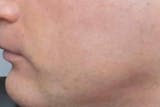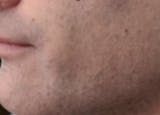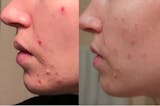Eczema is a complex disease influenced by multiple, individual factors, like trigger intensity, skin barrier strength, and immune system sensitivity.
Effective eczema treatment requires an integrated approach and persistence in finding the most effective treatments for your individual factors.
Eczema is a chronic skin condition characterized by periodic acute flares, marked by red, itchy, and inflamed skin. The severity and duration of an acute eczema flare are influenced by three main factors:
Various treatments and lifestyle adjustments can help manage the symptoms and minimize the impact of eczema on your life.
Individual factors play a significant role in determining the most effective treatment plan for eczema. The condition is generally described as a balancing act between skin barrier strength, trigger intensity, and immune intensity. However, those factors can be deeply personal in the way that they represent and work. As a result, your body’s response to treatments will also vary.
In this blog post, we will discuss how available treatments address one or more of the three main factors, differences in treatments for the different types of eczema, and how to tailor your treatment to your personal brand of eczema.
JUMP TO SECTION:
Trigger Control
Triggers are factors that can cause or worsen eczema symptoms and vary from person to person. Common triggers include harsh soaps, detergents, fragrances, allergens, climate, stress, and certain foods.
Controlling exposure to triggers can reduce the severity of the condition and allow symptoms to subside.
In our article on trigger avoidance we explore techniques to reduce exposure to different triggers while minimizing the impact on your life.
In our article on washing we explore how best to clean the skin, removing triggers, without causing a flare-up or weakening the skin barrier.
Your Triggers
By identifying and minimizing exposure to your personal triggers, you can help reduce the frequency and severity of eczema flare-ups.
To learn more about the triggers themselves, see our article on triggers. See the tracking and allergy tests to learn how to identify triggers.
Skin Barrier
In people with eczema, skin barrier strength is compromised, more moisture can escape and irritants can penetrate deeper into the skin resulting in dry and damaged skin.
In our section on moisturizing we cover how to build the skin barrier back up which is necessary to resolve a flare and how to keep it strong to prevent new flares.
In our section on managing symptoms we reviewed the tools and techniques that can be used to calm the eczema symptoms and reduce the damage to the skin barrier caused by an active flare.
Your Skin Barrier
The skin is made of proteins, ceramides, dead skin cells and other lipids. There are multiple processes the body uses to produce and organize the skin barrier and any one of which can go awry.
In our article on ceramides, we cover how they work to block triggers and provide smooth, moisturized skin naturally. We also cover how to supplement them.
The skin works symbiotically with the microbiome, the collection of microorganisms in the environment. The microbiome can help protect the skin and tune the immune system (which also protects the microbiome). There are a number of ways the microbiome can become disorganized.
In our article on the microbiome we cover signs that your microbiome is out of balance and how to cultivate a healthy skin microbiome.
Immune Control
The immune system is a complex network of organs and cells that protect the body from invasive pathogens. The third pillar of eczema treatment, the immune control, involves managing immune-influencing factors through lifestyle changes and treatment options that target parts of the immune system to restore normal activity.
Our section on understanding immune control provides a deep-dive into the role of the immune system in eczema.
Most people start their eczema treatment journey by going to the doctor. This typically means that they are in mid-flare and the symptoms are at their worst.
Because of the limitations on time and the patient’s focus on the symptoms, doctors’ go-to treatments usually revolve around immune modulation as it often provides the most direct symptom relief in a limited amount of time.
Triggers can take time to identify. The skin barrier takes time to heal and strengthen. Both processes involve more effort on the patient’s part and do not require a doctor. So expect your physician to focus on the medical immune modulation techniques below.
However, an approach to trigger avoidance/removal, skin barrier strengthening, and general immune control will provide the maximum long-term benefit of reducing flare intensity, duration, and occurrence.
The immune modulation treatments below have been grouped into self care, which can be done on your own, and medical treatments, which require a physician.
Self Care
Self care treatments are things which you can do on your own. To boost immune health holistically, please check out the following:
Our Diet and Nutrition page details how food can be used to reduce inflammation and support a healthy immune system.
Our Mental Health page details how mental well-being techniques can be used to boost immune health.
Our Exercise page details how physical activity can be used to improve immune health and;
Our Infections page learn how to identify and combat infections.
Some medications that use immune control can be bought over the counter with no prescription.
Our Antihistamines page will show you when and how to use antihistamines including which varieties work best to reduce itchiness and inflammation with oral or topical treatment.
Our Topical Steroids page covers how they can work to reduce inflammation and control eczema flares.
Medical Treatments
In some moderate or severe cases of eczema, it may be necessary to escalate the treatment by involving prescription medication. It is necessary to talk to your doctor about the following medical treatments:
Our Topical Steroids page also covers higher potency topical steroids can be used to reduce inflammation in more severe acute flares
Our Topical Calcineurin Inhibitors page covers TCIs and how they work to calm the immune response.
Our Phototherapy covers how light or UV therapy can be used to calm the immune response and boost vitamin D.
Our Immunosuppressant page covers how oral systemic immunosuppressives calm an overactive immune response and the risks associated with them.
Our JAK Inhibitors page covers how JAK Inhibitors interrupt a part of the inflammatory pathways.
Our Monoclonal Antibodies page covers how they work to reduce the inflammatory response.
Your Immune System
In many cases, an overactive immune system response leads to inflammation and irritation of the skin. However, the immune system is incredibly complex and understanding the root cause of the intensity of your immune reaction can be challenging.
The above treatments work in targeted ways to modify your immune response.
Working with a healthcare professional can help you identify the underlying factors contributing to your immune system's response enabling you to tailor your treatment plan accordingly.
Getting Help
To ensure the best chances of recovery, it is important to know what support is available, who to talk to, and what you can expect from each option.
Our Doctors page covers how can a doctor help you with and how to work with them to optimize your treatment.
Our Allergy Tests page covers what tests are available, how they work, and how to apply them to your eczema.
Your Plan Is As Unique As Your Eczema
Ultimately, the most effective eczema treatment plan will be as unique as your individual manifestation of the condition. By collaborating with healthcare professionals and utilizing self-care strategies, you can better manage your eczema symptoms and flare-ups and it will lead to an improved quality of life.
Conclusion
Eczema is a complex skin condition influenced by trigger intensity, skin barrier strength, and immune system sensitivity. It is essential to understand that an effective eczema treatment plan will vary from person to person as each individual experience with eczema is unique. As you embark on your journey to manage your eczema symptoms and flare-ups, remember that trial and error may be necessary to find the most effective treatments for you.
By remaining patient and persistent in finding the best combination of strategies, you can significantly improve your quality of life and gain better control of your eczema. Share your experiences with us! Tell us what has and hasn’t worked for you. What did we miss in this article that you've found personally impactful? Your insights can help others better understand and manage their eczema.



